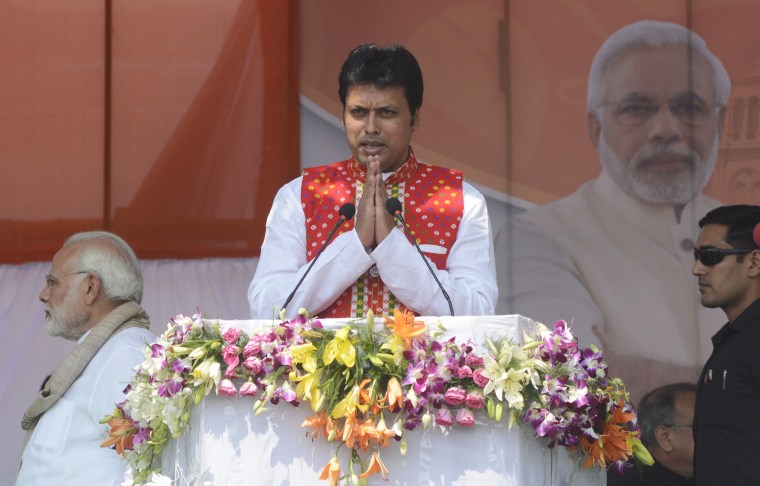New Delhi, September 16, 2020 – Authorities in India’s Tripura state should drop any legal threats against publications there, thoroughly investigate attacks on journalists, and guarantee press freedom in the state, the Committee to Protect Journalists said today.
On September 11, state Chief Minister Biplab Deb, a member of India’s ruling Bharatiya Janata Party, condemned recent local news coverage of the coronavirus pandemic, which he alleged overstated the severity of the crisis, saying, “history will not forgive them [journalists], I shall not forgive them either,” according to news reports and a video of his remarks shared on Twitter.
The following day, unidentified individuals beat up Parashar Biswas, a reporter with Bengali-language daily Syandan Patrika, at his home in Tripura’s Dhalai district, according to news reports and his editor Subal Kumar Dey, who spoke to CPJ over the phone. The attack came shortly after Biswas posted a video on his personal Facebook page, where he frequently posts his reporting, criticizing Deb’s comments and accusing the state government of mishandling the pandemic and unfairly blaming journalists.
On September 13, Shailendra K. Yadav, district magistrate and collector of West Tripura district, who reports to Deb’s government, issued a legal notice to Bengali-language newspaper Dainik Sambad, alleging that three articles in the paper criticizing the state’s handling of the pandemic violated the law, according to reports and a copy of the notice reviewed by CPJ.
“CPJ is concerned by recent disparaging remarks against the Indian press made by Tripura state Chief Minister Biplab Deb, which were followed by violence and legal threats against journalists,” said CPJ senior Asia researcher Aliya Iftikhar. “The Tripura government should reaffirm its commitment to press freedom, and should ensure that the legal threats are dropped, the attack on journalist Parashar Biswas is thoroughly investigated, and that the press can work freely.”
Dey told CPJ that he suspected Bharatiya Janata Party members were behind the attack on Biswas, noting that the attack came so quickly after Biswas posted his comments critical of Deb, and said that Biswas did not have any enemies. The party’s Tripura state spokesperson denied any connection to the attack, according to reports.
Dey said that Biswas was hospitalized with injuries to his head and face following the attack, was discharged from the hospital yesterday, and plans to return for a CT scan.
Additional Director General of Police Rajiv Singh did not respond to CPJ’s text message request for comment. He told NDTV that the police are investigating the attack. The police have not made any arrests as of today, Dey said.
The legal notice issued to Dainik Sambad accuses the paper of violating the Disaster Management Act and Epidemic Diseases Act in its reporting. Those laws were invoked nationally in March at the outbreak of the pandemic, and remain in effect, according to reports.
The notice names three articles: a September 3 news story on the challenges faced by front-line workers amid the coronavirus crisis in the state by Paramita Livingstone, a September 4 story about the pandemic with no byline, and a September 12 photo series depicting government pandemic efforts, also published with no byline.
In the notice, which could be followed by a legal complaint triggering a police investigation, the magistrate demanded to know the “documentary evidence” for claims printed in the paper, and asked “why news items should not be treated as false alarm and fake news which is sufficient to create panic among the citizens.”
If charged and convicted of violating the Disaster Management Act and Epidemic Diseases Act, those found responsible could face fines and up to two years in prison.
Yadav did not respond to CPJ’s request for comment sent via text message.
The Tripura Assembly of Journalists, an umbrella body of various journalists’ groups, issued a statement reviewed by CPJ claiming that journalists have been threatened and attacked throughout the state following Deb’s comments.
Deb’s media advisor Sanjay Mishra did not respond to CPJ’s text messages requesting comment. Mishra told the Indian Express that the government is committed to press freedom and media rights, but alleged that “a few local newspapers are trying to work with some agenda and that’s not right.” Yesterday evening, Deb said in a video statement reviewed by CPJ that his statements were not meant to insult anyone, and encouraged people not to believe “conspiracy theories” about the coronavirus.
Separately in Tripura state, on September 12, seven to eight men threatened Ashok Dasgupta, a reporter for local news channel News Today and the Tripura Khabar newspaper, in South Tripura while he was reporting on a water shortage in the area, according to the journalist, who spoke to CPJ over the phone.
According to Dasgupta and news reports, the men manhandled him and tried to snatch his mobile phone while he was reporting. He said he did not file a police complaint.
Since the outbreak of the COVID-19 pandemic, CPJ has documented a growing number of arrests, legal notices, and police investigations into journalists across India, including in the states of Uttar Pradesh, Himachal Pradesh, West Bengal, and Tamil Nadu.
